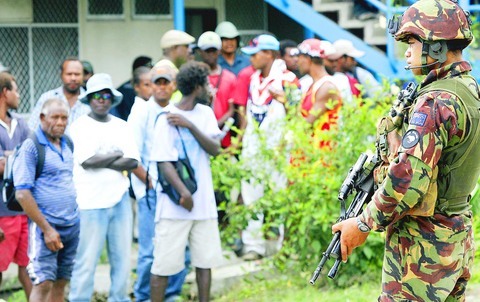Solomon Islands Prime Minister Snyder Rini denied yesterday that his election was influenced by back-room bribes bankrolled by Taiwan or China.
Rumors that Taiwan or China helped fund bribes that secured Rini the prime minister's job last week in a secret ballot of the troubled South Pacific nation's 50 lawmakers have abounded in the capital, Honiara, and have been blamed in part for a rampage by looters and rioters in the city's Chinatown.
But in an interview, Rini challenged his opponents to take such claims to the police.

PHOTO: AP
"That's what they may think. That's why I say to them, `If you have evidence bring it up to the police.' We have a law to deal with all this," he said. "But it's just hot air in the street and [has] no base," he said.
Rini also said that his new administration -- a coalition of lawmakers cobbled together following April 5 parliamentary elections -- would maintain its diplomatic links with Taiwan, despite overtures last year from China to switch sides.
Taiwan pushes its claim for sovereignty by seeking diplomatic links with countries. The Solomons is one of only 25 countries that have formal links with Taiwan. In return, it receives millions of dollars in aid each year from Taipei.
Rini said that Taiwan had come to the Solomons' assistance during the worst period of its communal strife, providing cash to pay compensation to people who had lost their homes and land during an insurgency that peaked with a coup in 2000.
"That's why we treasure our relationship very much. It's more than just a political relationship, it really goes deeper -- into our hearts," he said.
"We are committed to this relationship with Taiwan," Rini said, "as without Taiwan this country would no longer be a country."
He said China had made an approach to the previous government last year, but "we just say to them we are with Taiwan. That was the end of the connection."
Rini also insisted that Taiwanese aid money was being properly spent, not squandered by senior lawmakers.
"All the Taiwanese assistance is in the aid and development budget," he said.
"Nothing comes to the prime minister's office. Even that last prime minister -- he didn't have that bag of money," he said.
Meanwhile, a leading opposition lawmaker was refused bail yesterday on charges of inciting last week's riots. His allies also boycotted a sitting of parliament a day ahead of a crucial confidence vote today.
Charles Dausabea, a senior member of the opposition alliance, was remanded in custody for two weeks after appearing in Honiara Magistrates' Court on charges of inciting a riot, threatening violence and intimidation.
The court was told Dausabea, 46, incited an angry crowd outside parliament on Tuesday last week when Rini was elected prime minister, telling a waiting crowd of 200 people: "We lost, you people go do what you like now."
The crowd started throwing rocks and five vehicles belonging to government and security forces were smashed and burned.
After the demonstration outside parliament, crowds set on the capital's Chinatown district, leaving more than 50 buildings in ruins after a burning and looting rampage.

Shamans in Peru on Monday gathered for an annual New Year’s ritual where they made predictions for the year to come, including illness for US President Donald Trump and the downfall of Venezuelan President Nicolas Maduro. “The United States should prepare itself because Donald Trump will fall seriously ill,” Juan de Dios Garcia proclaimed as he gathered with other shamans on a beach in southern Lima, dressed in traditional Andean ponchos and headdresses, and sprinkling flowers on the sand. The shamans carried large posters of world leaders, over which they crossed swords and burned incense, some of which they stomped on. In this

Indonesia yesterday began enforcing its newly ratified penal code, replacing a Dutch-era criminal law that had governed the country for more than 80 years and marking a major shift in its legal landscape. Since proclaiming independence in 1945, the Southeast Asian country had continued to operate under a colonial framework widely criticized as outdated and misaligned with Indonesia’s social values. Efforts to revise the code stalled for decades as lawmakers debated how to balance human rights, religious norms and local traditions in the world’s most populous Muslim-majority nation. The 345-page Indonesian Penal Code, known as the KUHP, was passed in 2022. It

Near the entrance to the Panama Canal, a monument to China’s contributions to the interoceanic waterway was torn down on Saturday night by order of local authorities. The move comes as US President Donald Trump has made threats in the past few months to retake control of the canal, claiming Beijing has too much influence in its operations. In a surprising move that has been criticized by leaders in Panama and China, the mayor’s office of the locality of Arraijan ordered the demolition of the monument built in 2004 to symbolize friendship between the countries. The mayor’s office said in

‘TRUMP’S LONG GAME’: Minnesota Governor Tim Walz said that while fraud was a serious issue, the US president was politicizing it to defund programs for Minnesotans US President Donald Trump’s administration on Tuesday said it was auditing immigration cases involving US citizens of Somalian origin to detect fraud that could lead to denaturalization, or revocation of citizenship, while also announcing a freeze of childcare funds to Minnesota and demanding an audit of some daycare centers. “Under US law, if an individual procures citizenship on a fraudulent basis, that is grounds for denaturalization,” US Department of Homeland Security Assistant Secretary Tricia McLaughlin said in a statement. Denaturalization cases are rare and can take years. About 11 cases were pursued per year between 1990 and 2017, the Immigrant Legal Resource